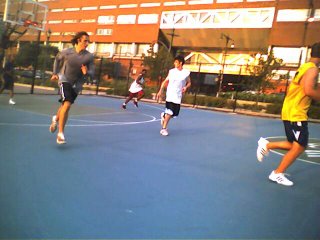 Last night we were having a great pickup session at the university gym. I was on a team with some good players and we had won two games in a row. A couple of guys I had never seen before assembled a team to play next. They were both wearing shirts indicating that they had played college football, and they both looked like college football players—thick, strong, athletic. They also seemed kinda mean. They didn't interact with other players in the gym and exuded an air of ruthless, cutthroat competitiveness. Now I know that in America, we celebrate this attitude. "Kobe is an assassin." "MJ will rip your heart out and eat it." But the culture of pickup at our gym is one of intense but friendly competition. Most everyone plays to win, but it's a fairly close-knit group and there is a lot of mutual respect and admiration.
Last night we were having a great pickup session at the university gym. I was on a team with some good players and we had won two games in a row. A couple of guys I had never seen before assembled a team to play next. They were both wearing shirts indicating that they had played college football, and they both looked like college football players—thick, strong, athletic. They also seemed kinda mean. They didn't interact with other players in the gym and exuded an air of ruthless, cutthroat competitiveness. Now I know that in America, we celebrate this attitude. "Kobe is an assassin." "MJ will rip your heart out and eat it." But the culture of pickup at our gym is one of intense but friendly competition. Most everyone plays to win, but it's a fairly close-knit group and there is a lot of mutual respect and admiration.As we started to play, I immediately found myself hating the football players. They were really surly and griped about everything—fouls, traveling, out of bounds—I think you know this type. They didn't appear to be having any fun. Unfortunately, I was guarding the "smaller" of the two and he was killing me. Three pointer in my eye. Surreal, hanging layup in traffic . . . and one. Ankle-breaking crossover leaving me in the dust. At one point, I fouled him and offered him possession. He grabbed the ball, shot me a nasty look, and walked away without saying a word. I was feeling really bad about myself (and absolutely despising him), but at the same time, my competitive instincts were kicking in. I did not want to lose to these guys. I knew that if we lost, I'd spend the whole night thinking about it, simmering in my frustration.
We play games to nine straight by ones and twos. I know that this is stupid, but it's part of the culture. I'd like to change the scoring system to twos and threes, but I think that math education has gotten so bad in this country that many people are incapable of counting in such large increments.
The score was 8-7 them (i.e., they could hit any basket to win but we needed a three-pointer). My man had scored five of their eight. I had only scored once, although I had assisted on three or four other baskets. The ball was inbounded to me and I started racing up the court ahead of my teammates. Often I will do this to draw the attention of the defense, allowing a trailing teammate an open cut to the hoop, whereupon I will drop an easy dime. But this time I was intent on shooting. Not only did I want our team to win, I wanted my man to feel the sting of the loss most acutely. As I came across halfcourt the entire defense sagged back. Without hesitation, I pulled the trigger on a long three and drained it, winning the game.
I freaked out—in both triumph and relief. I turned and ran down the court, arms raised, yelling "WHAT?! WHAT?!" as if in disbelief. It felt amazing. I saw the guy I was guarding flop against the bleachers and throw a towel over his head. My teammates and I exchanged hi-fives as we strolled to the water fountain. At that moment, I felt that my night had been made, that I would sleep soundly replaying the sweet swish of that last shot in my dreams.
But soon after I started to feel bad. Had I acted in an unsportsmanlike manner? If the football players had won, I bet they would have walked off in smug silence, without explicitly rubbing our faces in it. The knowledge that they had beaten us would have been enough. Why did I feel the need to twist the knife? And aren't I too old to be hooting like a teenager? As the only faculty member who plays regularly, I should be trying to set a good example. To make it worse, two players on the other team were people that I really like—including the best female player in the gym. Do they think less of me because of my outburst? Clearly, it wasn't about them, but they had also endured the loss.
I think that one reason I felt so guilty about my actions is that they were deeply reflective of my insecurities about aging. As much as I have worked to accept the deterioration of my game, I still find it hard to lose to young, arrogant players. I guess I want them to know that they, too, will get old and that one day, there will be even younger players seeking to humiliate them. But with my friends, I'm frequently talking about those who play honorably and those who do not, and even though the initial adrenaline rush of that game-winner was awesome, in retrospect my post-shot behavior did not seem particularly honorable.



























